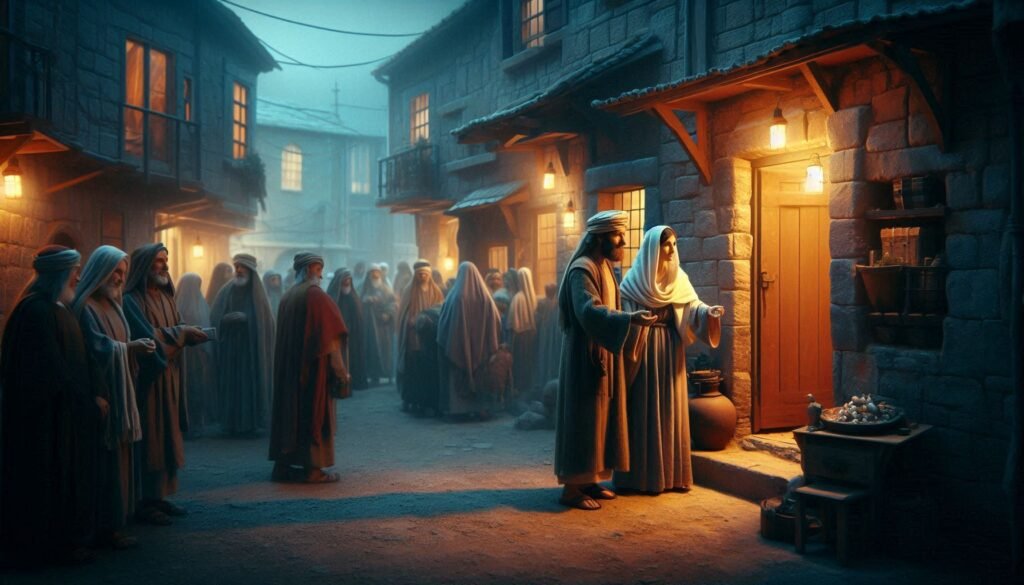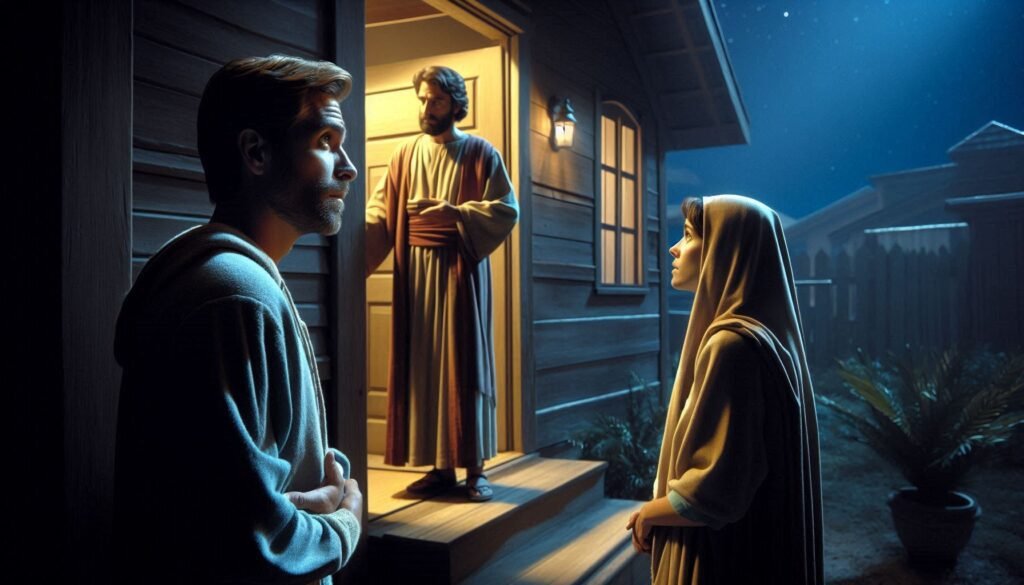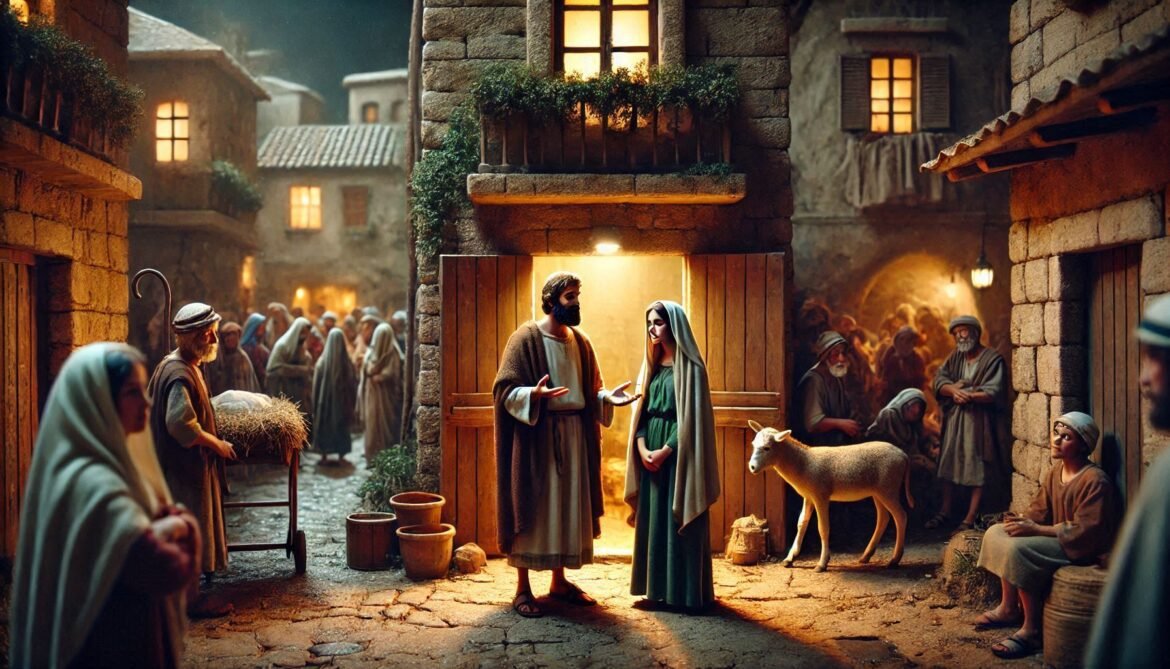When we think of the nativity story, we picture Mary and Joseph’s desperate search for shelter in Bethlehem, only to be turned away by the innkeeper and sent to a stable (Luke 2:7). But have we misunderstood this pivotal figure? Was the innkeeper a heartless villain or an unsung hero in the Christmas narrative?
Let’s dive into the story behind the story and uncover a fresh perspective that might just change how you view this iconic moment.

The Villainous Image: Turning Away a Pregnant Woman
It’s easy to cast the innkeeper as the antagonist of the nativity story. After all, refusing shelter to a woman in labor seems cold-hearted. For centuries, plays, sermons, and even modern nativity reenactments have portrayed the innkeeper as a brusque figure, unwilling to help.
But here’s the twist: the Bible doesn’t even mention an innkeeper.
The Biblical Account
Luke 2:7 simply says,
“…and she gave birth to her firstborn son and wrapped him in swaddling cloths and laid him in a manger, because there was no place for them in the inn.”
Notice what’s missing? No direct reference to an innkeeper. No dialogue. No refusal. Could this mean we’ve misinterpreted the narrative all along?
A Misunderstood Hero? Let’s Revisit the Context

To truly understand, we need to step into the sandals of first-century Bethlehem:
1. The Crowded City
Bethlehem was overwhelmed with visitors due to the Roman census (Luke 2:1-5). Every home, guest room, and lodging space was likely packed with extended families. The word “inn” (Greek: kataluma) in this passage could also mean a “guest room” in a private home rather than a commercial inn like a motel. This is a crucial distinction—Bethlehem wasn’t a bustling metropolis with many inns. Instead, it was a small town, and hospitality was often offered in private homes.
2. Limited Options
Given the chaos, the innkeeper—or perhaps a homeowner—did what they could. Turning away Mary and Joseph was not necessarily an act of malice but a matter of practicality. No space was available, but a stable or cave where animals were kept could offer warmth, privacy, and relative safety for the night.
3. A Small Act of Kindness
If the innkeeper did offer the stable, they may have been doing the best they could with what they had. Instead of heartlessness, this act could reflect humility and resourcefulness—a way of helping strangers in dire need.
The Role of Hospitality in Ancient Cultures
In ancient times, hospitality was more than a kindness—it was a cultural and religious duty. In the Bible, hospitality was considered a sacred responsibility, often linked to showing kindness to strangers (Hebrews 13:2). The innkeeper, whether in a formal inn or a private home, might have been doing their best to honor this cultural virtue. This emphasizes that while the circumstances were less than ideal, the innkeeper’s actions were likely driven by a sense of duty and survival in a town filled to capacity.
Theological Reflection: God in the Margins
Whether the innkeeper was indifferent or compassionate, the circumstances highlight a profound truth: Jesus chose to enter the world in humility.
Born in a manger, the Savior of the world identified with the poor, the marginalized, and the overlooked. This humble birth was not a coincidence but a divine statement:
“He came to His own, and His own people did not receive Him” (John 1:11).
The innkeeper’s story reminds us that even small, imperfect acts of kindness can play a role in God’s plan.
Lessons for Today
As we celebrate Christmas, let’s reflect on how the story of the innkeeper challenges and inspires us:
1. Hospitality Matters
The innkeeper may not have had much to offer, but they made space—albeit unconventional—for Mary and Joseph. This Christmas, how can we “make room” for others, especially those in need? Are we willing to give what little we have, just like the innkeeper did, even if it’s not a perfect solution?
2. Reframe Our Judgments
We’re quick to label people as villains based on limited information. What if we took a moment to consider their circumstances and motives? Like the innkeeper, perhaps they’re doing their best with what they have. Let’s show grace, remembering that every situation has layers we may not see at first glance.
3. Small Actions, Big Impact
The innkeeper’s simple gesture—providing a stable—became part of the most celebrated story in history. This Christmas, remember that even the smallest acts of kindness can have eternal significance. In your day-to-day life, how can your small acts of generosity make a big difference for others?
A Closing Reflection
Maybe the innkeeper wasn’t a villain or a hero—but simply a person doing the best they could in difficult circumstances. And that is the essence of Christmas, isn’t it? God entering our world in the most humble of ways, bringing light to our darkest moments, and reminding us that even in a small stable, His presence makes all the difference.
A Christmas Prayer
“May we, like the innkeeper, find ways to offer what we have, no matter how small, to welcome Christ into our lives this Christmas. May our hearts be open, our actions kind, and our faith unwavering as we celebrate the birth of our Savior. Amen.”
What do you think about the innkeeper’s role? Share your thoughts in the comments below! And as you prepare for Christmas, remember the beauty of finding hope, even in the most unexpected places.



